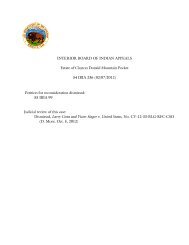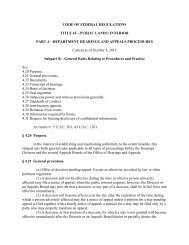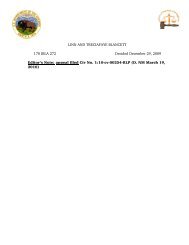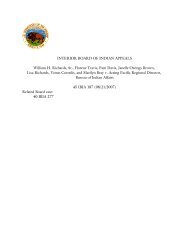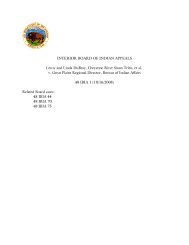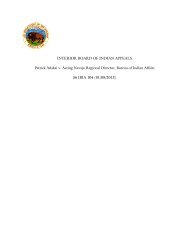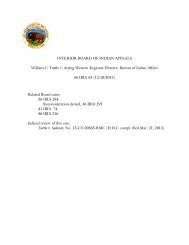43 IBIA 1 - About the Office of Hearings and Appeals
43 IBIA 1 - About the Office of Hearings and Appeals
43 IBIA 1 - About the Office of Hearings and Appeals
You also want an ePaper? Increase the reach of your titles
YUMPU automatically turns print PDFs into web optimized ePapers that Google loves.
INTERIOR BOARD OF INDIAN APPEALS<br />
Wind River Resources Corp. v. Western Regional Director, Bureau <strong>of</strong> Indian Affairs<br />
<strong>43</strong> <strong>IBIA</strong> 1 (04/06/2006)<br />
Related Board case:<br />
42 <strong>IBIA</strong> 72
United States Department <strong>of</strong> <strong>the</strong> Interior<br />
OFFICE OF HEARINGS AND APPEALS<br />
INTERIOR BOARD OF INDIAN APPEALS<br />
801 NORTH QUINCY STREET<br />
SUITE 300<br />
ARLINGTON, VA 22203<br />
WIND RIVER RESOURCES CORP.,<br />
Appellant,<br />
v.<br />
ACTING WESTERN REGIONAL<br />
DIRECTOR, BUREAU OF INDIAN<br />
AFFAIRS,<br />
Appellee.<br />
: Order Dismissing Appeal<br />
: Without Prejudice<br />
:<br />
:<br />
: Docket No. <strong>IBIA</strong> 06-24-A<br />
:<br />
:<br />
:<br />
: April 6, 2006<br />
Wind River Resources Corporation (Appellant) appeals from an October 21,<br />
2005 decision <strong>of</strong> <strong>the</strong> Acting Western Regional Director, Bureau <strong>of</strong> Indian Affairs (Regional<br />
Director; BIA) concerning bonding requirements for Appellant’s oil <strong>and</strong> gas operations on<br />
<strong>the</strong> Uintah <strong>and</strong> Ouray Reservation (Reservation) <strong>of</strong> <strong>the</strong> Ute Indian Tribe (Tribe). We<br />
conclude <strong>the</strong> appeal is not ripe for Board review, <strong>and</strong> <strong>the</strong>refore we dismiss it without<br />
prejudice.<br />
Appellant has been conducting oil <strong>and</strong> gas operations on <strong>the</strong> Reservation pursuant to<br />
a personal bond secured by an irrevocable letter <strong>of</strong> credit from a bank, which is a type <strong>of</strong><br />
bond listed in regulations governing minerals agreements for <strong>the</strong> development <strong>of</strong> Indianowned<br />
minerals. See 25 C.F.R. §§ 225.1 (Purpose <strong>and</strong> scope), 225.30 (Bonds). On<br />
February 14, 2005, <strong>the</strong> Superintendent <strong>of</strong> <strong>the</strong> Uintah <strong>and</strong> Ouray Agency (Superintendent;<br />
Agency) notified Appellant that <strong>the</strong> Agency would no longer accept personal bonds<br />
accompanied by letters <strong>of</strong> credit for companies conducting business on <strong>the</strong> Reservation.<br />
Instead, <strong>the</strong> Superintendent identified a subset <strong>of</strong> <strong>the</strong> types <strong>of</strong> bonds listed under section<br />
225.30 as <strong>the</strong> only types that <strong>the</strong> Agency would accept. 1/<br />
1/ In addition to refusing to accept personal bonds accompanied by letters <strong>of</strong> credit, <strong>the</strong><br />
Superintendent’s decision also stated that <strong>the</strong> Agency would no longer accept Nationwide or<br />
Statewide Bonds, which are also listed in section 225.30. He identified <strong>the</strong> following types<br />
<strong>of</strong> bonds listed in section 225.30 as acceptable to <strong>the</strong> Agency: (1) Surety or Collective Bond<br />
from a qualified Surety approved by <strong>the</strong> Department <strong>of</strong> <strong>the</strong> Treasury; (2) Cash Bond,<br />
Cashier’s Check or Certified Check; <strong>and</strong> (3) Certificate <strong>of</strong> Deposit issued by a financial<br />
institution, <strong>the</strong> deposits <strong>of</strong> which are Federally-insured.<br />
<strong>43</strong> <strong>IBIA</strong> 1
Appellant appealed <strong>the</strong> Superintendent’s decision to <strong>the</strong> Regional Director,<br />
contending that <strong>the</strong> Superintendent must accept a personal bond accompanied by an<br />
irrevocable letter <strong>of</strong> credit because it is among <strong>the</strong> types <strong>of</strong> bonds listed in section 225.30.<br />
During <strong>the</strong> course <strong>of</strong> that appeal, <strong>the</strong> Ute Indian Tribe moved to set aside <strong>the</strong><br />
Superintendent’s decision. The Tribe stated that it did not object to Appellant posting a<br />
personal bond accompanied by an irrevocable letter <strong>of</strong> credit. The Tribe asserted that “[i]t is<br />
not clear that requiring a surety or similar bond would be in <strong>the</strong> best interest <strong>of</strong> <strong>the</strong> Tribe”<br />
because “[t]he Tribe has been advised that surety <strong>and</strong> certain o<strong>the</strong>r forms <strong>of</strong> bonds for oil<br />
<strong>and</strong> gas operations are difficult for some companies to obtain at this time, are <strong>of</strong>ten<br />
expensive, <strong>and</strong> do not necessarily provide a commensurate increase in security.” July 22,<br />
2005 Ute Indian Tribe’s Motion to Set Aside Acting Superintendent’s Decision at 3.<br />
According to <strong>the</strong> Tribe, <strong>the</strong> “more significant issue” was whe<strong>the</strong>r <strong>the</strong> amount <strong>of</strong> Appellant’s<br />
bond was adequate. Id.<br />
On October 21, 2005, <strong>the</strong> Regional Director issued her decision. The Regional<br />
Director concluded that <strong>the</strong> Superintendent had <strong>the</strong> legal authority to refuse to accept<br />
certain types <strong>of</strong> bonds, such as letters <strong>of</strong> credit, even if <strong>the</strong>y were <strong>of</strong> a type listed under<br />
section 225.30. The Regional Director also concluded, however, that <strong>the</strong> Superintendent’s<br />
decision was not adequately explained or supported by <strong>the</strong> factual record. Therefore, her<br />
decision rem<strong>and</strong>ed <strong>the</strong> matter to <strong>the</strong> Superintendent “in order that he may provide<br />
substantial, on-<strong>the</strong>-record evidence as to <strong>the</strong> rationale <strong>and</strong> factual basis for <strong>the</strong> Agency’s<br />
decision.” Regional Director’s Decision at 6. In addition, <strong>the</strong> Regional Director directed<br />
<strong>the</strong> Superintendent to address both <strong>the</strong> “best interest” <strong>and</strong> “adequacy” issues raised by <strong>the</strong><br />
Tribe.<br />
Appellant appealed <strong>the</strong> Regional Director’s decision to <strong>the</strong> Board. On February 23,<br />
2006, before briefs on <strong>the</strong> merits were filed, <strong>the</strong> Board suggested that this appeal might not<br />
be ripe for Board review, <strong>and</strong> ordered briefing on that issue. The Board noted that <strong>the</strong> “best<br />
interest” issue raised by <strong>the</strong> Tribe implicated what type <strong>of</strong> bond might be deemed acceptable<br />
or appropriate, as did <strong>the</strong> Regional Director’s requirement that <strong>the</strong> Superintendent provide<br />
a properly supported rationale for his decision. Thus, it appeared possible that on rem<strong>and</strong>,<br />
<strong>the</strong> Superintendent could conclude, based on a more fully-developed record <strong>and</strong> after<br />
considering or reconsidering all <strong>of</strong> <strong>the</strong> arguments raised by <strong>the</strong> Tribe <strong>and</strong> by Appellant, that<br />
<strong>the</strong> type <strong>of</strong> bond <strong>of</strong>fered by Appellant would be in <strong>the</strong> best interest <strong>of</strong> <strong>the</strong> Tribe <strong>and</strong> would<br />
be acceptable to BIA. In that case, <strong>the</strong> Regional Director’s legal conclusion that BIA has<br />
authority to refuse to accept certain types <strong>of</strong> bonds listed under section 225.30 would have<br />
no effect on Appellant, <strong>and</strong> a decision by <strong>the</strong> Board on this issue would have been merely<br />
advisory. See Wopsock v. Western Regional Director, 42 <strong>IBIA</strong> 117, 121 (2006) (Board<br />
does not issue advisory opinions).<br />
<strong>43</strong> <strong>IBIA</strong> 2
On <strong>the</strong> o<strong>the</strong>r h<strong>and</strong>, if <strong>the</strong> Superintendent were again to decide on rem<strong>and</strong> to refuse<br />
<strong>the</strong> type <strong>of</strong> bond <strong>of</strong>fered by Appellant, he would be required to articulate <strong>the</strong> specific basis<br />
for such refusal, <strong>and</strong> not simply declare, without explanation, that <strong>the</strong> Agency no longer<br />
accepts certain types <strong>of</strong> bonds. See Feb. 14, 2005 Superintendent’s Decision. In that case,<br />
an appeal could be decided with <strong>the</strong> benefit <strong>of</strong> a complete administrative record <strong>and</strong> <strong>the</strong> full<br />
range <strong>of</strong> issues could be addressed.<br />
Appellant, <strong>the</strong> Regional Director, <strong>and</strong> <strong>the</strong> Tribe filed responses to <strong>the</strong> Board’s request<br />
for briefing on ripeness. All agree that this appeal is not ripe for Board review. 2/<br />
Although <strong>the</strong> ripeness doctrine does not impose a jurisdictional limitation on <strong>the</strong><br />
Board, <strong>the</strong> Board has applied it in appropriate cases <strong>and</strong> follows <strong>the</strong> analysis used by <strong>the</strong><br />
Federal courts. See, e.g., Bullcreek v. Western Regional Director, 40 <strong>IBIA</strong> 196, 202 n.5<br />
(2005). Three considerations are relevant: will a delay cause hardship, will Board<br />
intervention interfere with fur<strong>the</strong>r administrative action, <strong>and</strong> is fur<strong>the</strong>r factual development<br />
<strong>of</strong> <strong>the</strong> issues required? Id.<br />
We conclude that all three considerations weigh in favor <strong>of</strong> dismissing this appeal.<br />
First, a delay will not cause hardship. The Regional Director’s decision, while upholding <strong>the</strong><br />
Superintendent on a legal principle, rem<strong>and</strong>ed <strong>the</strong> portion <strong>of</strong> <strong>the</strong> Superintendent’s decision<br />
that had an actual impact on Appellant — <strong>the</strong> specific decision to refuse to accept Appellant’s<br />
personal bond accompanied by an irrevocable letter <strong>of</strong> credit. The rem<strong>and</strong> requires <strong>the</strong><br />
Superintendent to consider <strong>the</strong> “best interest” issue <strong>and</strong> to provide a proper rationale <strong>and</strong><br />
factual basis for his decision, effectively requiring him to issue a new decision, even if he<br />
reaches <strong>the</strong> same conclusion. 3/ In <strong>the</strong> meantime, Appellant will be subject to no<br />
2/ The Regional Director also raises <strong>the</strong> issue <strong>of</strong> st<strong>and</strong>ing. Ripeness <strong>and</strong> st<strong>and</strong>ing are<br />
“closely related in that each focuses on whe<strong>the</strong>r <strong>the</strong> harm asserted has matured sufficiently to<br />
warrant judicial intervention.” Bullcreek v. Western Regional Director, 40 <strong>IBIA</strong> 196,<br />
203 n.6 (2005), quoting Skull Valley B<strong>and</strong> <strong>of</strong> Goshute Indians v. Nielson, 376 F.3d 1223,<br />
1234 (10th Cir. 2004). We conclude that ripeness is <strong>the</strong> more appropriate doctrine to apply<br />
in dismissing this case, <strong>and</strong> express no opinion on whe<strong>the</strong>r Appellant would o<strong>the</strong>rwise have<br />
st<strong>and</strong>ing to pursue this appeal.<br />
3/ The Regional Director only affirmed <strong>the</strong> Superintendent’s decision “ins<strong>of</strong>ar as <strong>the</strong><br />
general question <strong>of</strong> authority is concerned.” Regional Director’s Decision at 6. Although<br />
<strong>the</strong> Regional Director did not expressly require <strong>the</strong> Superintendent to issue a new decision,<br />
we construe that to be <strong>the</strong> practical effect <strong>of</strong> <strong>the</strong> Regional Director’s decision, particularly in<br />
light <strong>of</strong> <strong>the</strong> requirement to address <strong>the</strong> “best interest” <strong>and</strong> “adequacy” issues raised by <strong>the</strong><br />
Tribe.<br />
<strong>43</strong> <strong>IBIA</strong> 3
adverse effects. Second, Board intervention at this time would interfere with<br />
implementation <strong>of</strong> <strong>the</strong> Regional Director’s rem<strong>and</strong> because while <strong>the</strong> appeal is pending, BIA<br />
lacks jurisdiction over <strong>the</strong> matter. See Bullcreek v. Western Regional Director,<br />
39 <strong>IBIA</strong> 100, 101-02 (2003). As we have noted, <strong>the</strong> rem<strong>and</strong> could result in a different<br />
decision on what type <strong>of</strong> bond <strong>the</strong> Superintendent will accept, which could resolve <strong>the</strong><br />
dispute without fur<strong>the</strong>r appeals. Third, <strong>the</strong> Regional Director concluded that <strong>the</strong><br />
Superintendent’s decision lacked an adequate explanation or factual basis, thus requiring<br />
fur<strong>the</strong>r development <strong>of</strong> <strong>the</strong> record, even assuming <strong>the</strong> Superintendent <strong>and</strong> Regional<br />
Director are correct on <strong>the</strong> general question regarding BIA’s authority.<br />
We conclude that this appeal is not ripe for Board review, <strong>and</strong> should be dismissed<br />
without prejudice to Appellant’s right to appeal any issues that may arise from subsequent<br />
decisions by <strong>the</strong> Superintendent <strong>and</strong> Regional Director concerning bonding requirements<br />
imposed on Appellant, including but not limited to <strong>the</strong> Regional Director’s conclusion that<br />
BIA is not legally precluded from restricting <strong>the</strong> types <strong>of</strong> acceptable bonds to a subset <strong>of</strong><br />
those listed in <strong>the</strong> regulations.<br />
Therefore, pursuant to <strong>the</strong> authority delegated to <strong>the</strong> Board <strong>of</strong> Indian <strong>Appeals</strong> by <strong>the</strong><br />
Secretary <strong>of</strong> <strong>the</strong> Interior, <strong>43</strong> C.F.R. § 4.1, <strong>the</strong> Board dismisses this appeal without prejudice<br />
because it is not ripe for Board review.<br />
I concur:<br />
// original signed // original signed<br />
Steven K. Linscheid<br />
Amy B. Sosin<br />
Chief Administrative Judge<br />
Acting Administrative Judge<br />
<strong>43</strong> <strong>IBIA</strong> 4




